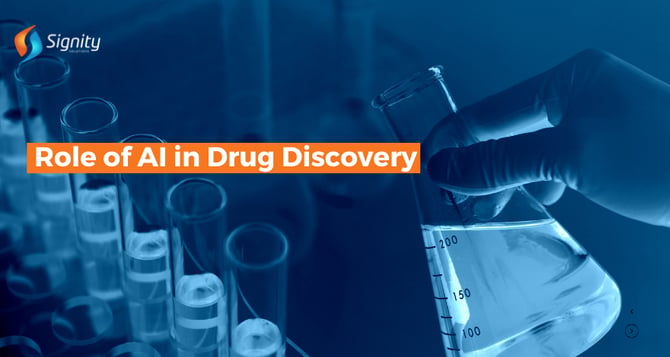Role of AI in Drug Discovery: How it's Impacting the Healthcare Industry
Artificial Intelligence plays a crucial role in drug discovery, helping the healthcare industry produce the best solutions in less time and at a reasonable price. Explore the AI benefits, use cases, real-world examples, impact, and challenges in the pharmaceutical market.

Developing drugs with the traditional methods has been a time-consuming and resource-intensive process. It involves various challenges like high costs, prolonged timelines, and risk of failure.
On the other hand, the evolution of Artificial Intelligence technology offers a transformative approach to tackling these challenges. Healthcare businesses that have implemented AI in drug discovery have benefited in several ways.
Integrating AI for drug discovery and development can be a tricky part; hence, it is essential to partner with an AI healthcare development company that has hands-on experience.
This blog is your complete guide to understanding the role of AI in drug discovery, its benefits, popular use cases, challenges, and real-world examples of how the pharmaceutical industry is using this technology.
Let’s begin by understanding the reasons why healthcare businesses should invest in AI for drug discovery.
Key Takeaways
- AI significantly reduces drug discovery timelines and costs by automating processes like molecular simulations, clinical trial optimization, and virtual screening.
- AI enables tailored treatments through precise biomedical data analysis, improving patient outcomes and minimizing side effects.
- Companies like Insilico Medicine and Exscientia have demonstrated AI's potential by developing drugs faster and repurposing treatments for new uses.
- While AI offers transformative benefits, businesses must address hurdles like data quality, cost of implementation, and workflow integration for successful adoption.
Benefits of AI in Modern Drug Development- Why Should Businesses Invest?
The role of AI in drug discovery is wide, helping the healthcare industry produce drugs in a short time without investing much. Various benefits of AI in drug discovery include:

1. Accelerated Drug Development
One of the biggest benefits of investing in AI in drug discovery and development is that it helps speed up the process. It reduces the time required to discover and develop drugs by automating processes like molecular simulations and synthesis pathway generation.
2. Improved Clinical Trial Design
AI also optimizes trial parameters, patient selection, and protocol design through advanced tools in order to increase the likelihood of success and reduce costs. It enhances the ability to stimulate trial outcomes, minimize risks, and refine drug dosage recommendations.
3. Personalized Treatments
Another major benefit of investing in AI in drug discovery is that it helps provide personalized treatments to patients. The technology uses biomedical data analysis to create therapies tailored to individual patient profiles, improving treatment outcomes and minimizing side effects.
4. Enhanced Biomedical Data Analysis
AI in drug discovery processes complex and high-dimensional biological data to uncover patterns and insights. It significantly advances biomedical data analysis and helps integrate data from multiple sources like genomic, proteomic, and clinical data for a comprehensive understanding of disease mechanisms.
5. Fraud Detection in Clinical Trials
Artificial Intelligence identifies anomalies in trial data to detect fraud and ensure the integrity and reliability of clinical outcomes. The process guarantees compliance with regulatory standards and protects investments in drug development.
6. Predictive Maintenance in Drug Manufacturing
AI in modern drug development ensures smooth operations in drug production facilities through predictive maintenance in order to minimize downtime. This approach also extends the lifespan of equipment and reduces production costs over time.
7. AI-Driven Wearable Devices
AI-driven wearable devices monitor patient responses in real-time during trials to provide invaluable data to refine drugs and improve safety profiles. It also enables remote monitoring of patients, reducing the need for frequent hospital visits and improving trial participation rates.
Wondering what are the roles of AI in drug discovery? The next section will explain its popular use cases.
Applications of AI in Drug Discovery
Did you know that AI in the drug discovery market size is projected to reach USD 7.94 billion by 2030, with North America dominating the industry? Below are some important use cases of Artificial Intelligence in drug discovery and development that make the process easy and quick.

1. Target Identification, Selection, and Validation
AI in drug discovery helps identify and validate biological targets for drug development, hence ensuring that the targets are actionable. Techniques like graph-convolutional networks analyzing molecular and protein interactions make the target selection and validation more effective.
2. Prediction of Drug Properties
Another major role of AI in drug discovery is that the models predict essential properties like solubility, toxicity, and efficacy to accelerate the assessment of candidate molecules. Further methods like autoencoder architectures uncover relationships in high-dimensional data to enhance property predictions.
3. Candidate Drug Prioritization
Artificial Intelligence streamlines the development pipeline and reduces time-to-market for promising therapies by ranking potential drug candidates and evaluating their likelihood of success in preclinical and clinical trials.
4. Virtual Screening
By simulating the interaction between molecules and targets, AI performs virtual screening to narrow down compounds likely to yield effective drugs. It significantly reduces the time required for lab-based trials.
5. Drug Combination Analysis
AI explores the synergistic effects of drug combinations using tools such as machine learning to predict outcomes and optimize treatments for complex diseases. It ultimately improves patient outcomes and advances personalized medicine.
6. Intelligent Image-Activated Cell Sorting
AI-powered imaging identifies cell responses to drugs, aiding in high-throughput compound screening and refining target specificity while enabling precise selection of effective drug candidates.
Several healthcare companies have already put AI to use for drug discovery, and we have listed the popular examples in the section below.
Real-World Examples of AI in Drug Discovery
A number of pharmaceutical businesses have already put AI into action to gain the best results. Here are some real-world examples.
Insilico Medicine
Insilico used AI to discover INS018_055, a drug for Idiopathic Pulmonary Fibrosis (IPF). The AI-driven platform identified a novel target and designed molecules efficiently, cutting the drug discovery timeline by nearly half. The drug is now in Phase II clinical trials, highlighting the potential of AI in streamlining processes for diseases with unmet needs.
Exscientia
This company developed the first AI-designed drug, DSP-1181, to treat obsessive-compulsive disorder. By using AI, the team identified a suitable drug candidate significantly faster than traditional methods. The drug has progressed to clinical trials, marking a milestone in AI-powered drug development.
BenevolentAI
This company applied AI to identify existing drugs that could be repurposed for COVID-19. Their platform discovered that baricitinib, originally for rheumatoid arthritis, could be effective against COVID-19 inflammation. This discovery was validated in clinical trials and authorized for emergency use during the pandemic.
Also read: Check out how Google created Tx-LLM for drug discovery for faster and more reliable processes.
Impact of AI in Drug Discovery on Healthcare Industry
AI has several positive impacts on the pharmaceutical industry, making processes quick, reliable, and safe.

1. Faster Access to Treatments
AI accelerates the drug discovery process, reducing the time required to bring new medications to market. It enables patients to access life-saving treatments for diseases with unmet medical needs more quickly.
2. Enhanced Disease Management
By leveraging AI, researchers can identify effective drugs for complex and rare diseases, improving overall disease management. AI-driven insights enable precision medicine, tailoring treatments to individual patient needs.
3. Cost-Effective Drug Development
AI reduces research and development costs by automating tasks like virtual screening, molecular simulations, and synthesis pathway generation. These cost savings make innovative treatments more affordable for patients and healthcare systems.
4. Better Monitoring and Patient Management
AI-driven wearable devices improve patient engagement by providing real-time health data during clinical trials and treatments. It enhances drug efficacy monitoring and supports personalized care.
5. Higher Standards of Drug Safety
AI improves safety evaluations by predicting drug properties, side effects, and interactions early in development. It helps reduce the risks of adverse outcomes when drugs reach the market.
Challenges of AI in Drug Discovery and Development
When implementing AI in drug discovery, businesses can face various challenges. Some major challenges include:

1. Data Quality and Availability
AI models rely on high-quality and well-annotated datasets. Hence, drug discovery often needs help with complete, consistent, and proprietary data, hindering the training and accuracy of AI systems.
2. Lack of Standardization
Lack of standardization in AI-driven drug discovery leads to challenges in integrating diverse data formats, algorithms, and tools, hindering reproducibility and reliability.
3. Cost of Implementation
Developing and deploying AI solutions requires significant investment in infrastructure, expertise, and computational power, making it challenging for small-scale and resource-constrained companies.
4. Analysis Techniques
Complexity in selecting and applying appropriate AI analysis techniques can lead to inaccurate predictions, limiting their effectiveness in drug discovery.
5. Integration with Existing Workflows
Incorporating AI tools into traditional drug discovery workflows can be complex and resource-intensive. Resistance to change and lack of technical expertise further complicate integration.
6. Scalability of AI Solutions
While AI excels in analyzing large datasets, scaling these models to handle ever-increasing amounts of data efficiently remains a challenge. Ensuring computational resources and energy efficiency is critical for broader adoption.
Integrate AI Modern Drug Development With Our Experts at Signity
Want to build custom AI solutions for modern discovery? Our AI experts at Signity have hands-on experience in developing AI solutions that meet the specific needs of businesses.
Unlock the Future of Pharmaceuticals with AI-driven Drug Discovery
Get in touch with our AI experts to build custom AI solutions for drug discovery.
We build custom, cost-effective, and efficient AI solutions to help pharmaceutical companies get the best of the technology. Connect with our team at Signity to build robust AI solutions.
Frequently Asked Questions
Have a question in mind? We are here to answer. If you don’t see your question here, drop us a line at our contact page.
What is the Role of AI in Drug Discovery?
![]()
AI plays a crucial role in drug discovery by accelerating the identification of potential drug candidates through advanced data analysis and predictive modeling, significantly reducing the time and cost associated with traditional methods.
How is AI used in Pharmaceutical Development?
![]()
AI is utilized in pharmaceutical development to enhance the efficiency of drug candidate identification and optimize the drug design process through predictive modeling and data analysis.
What is the Role of Generative AI in Drug Discovery?
![]()
Generative AI plays a pivotal role in drug discovery by creating novel molecular structures and optimizing chemical compounds through algorithms that simulate biological interactions.
How Successful are AI-Discovered Drugs?
![]()
AI-discovered drugs are demonstrating promising success, with several candidates advancing to clinical trials and showing efficacy. As AI refines the discovery process, the likelihood of successful outcomes and innovative therapies is expected to rise.
How does AI Improve the Drug Discovery Process?
![]()
AI reduces time and costs, enhances accuracy in target identification, and enables faster identification of promising drug candidates compared to traditional methods.





